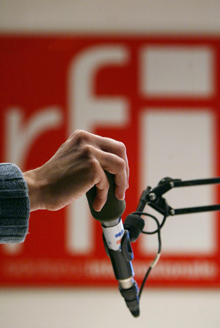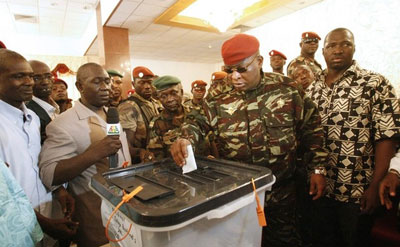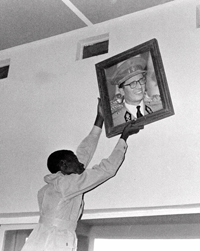
Guinean journalist assaulted by police, no arrests made
New York, March 8, 2012–Guinean authorities must investigate and bring appropriate charges against police officers who assaulted a journalist at the Central Bank of Guinea, the Committee to Protect Journalists said today. Reporter Kounkou Mara suffered head and other injuries in the attack. Mara, a reporter for the privately owned Le Lynx, was denied entry…

Guinea’s censorship order puts RFI in difficult spot
On Monday, Guinea’s state-controlled media regulatory agency imposed a “temporary” ban on media coverage of the July 19 attack on the private residence of President Alpha Condé, silencing private radio and television talk programs in which critical questions were being raised about the episode. In such circumstances, Guinean listeners turn to foreign media outlets such…

In Guinea, media hopeful with democratic transition
Guinea’s historic presidential elections and new constitution are changing the media landscape in the West African country. Since last month, the military-led Transitional National Council has passed two new laws decriminalizing defamation and created a new media regulatory body.

50 years on, Francophone Africa strives for media freedom
CPJ has joined with African press freedom groups to urge African leaders to end repression of the media as they celebrate 50 years since the end of colonial rule. We will publish a series of blogs this week by African journalists reflecting on the checkered history of press freedom over that period.This year is the 50th anniversary of…
Attacks on the Press 2009: Africa Developments
ATTACKS ON THE PRESS: 2009 • Main Index AFRICA Regional Analysis: • In African hot spots, journalists forced into exile Country Summaries • DRC • Ethiopia • Gambia • Madagascar • Niger • Nigeria • Somalia • Uganda • Zambia • Zimbabwe • Other developments BOTSWANA A media law was enacted in January requiring government…
Attacks on the Press in 2008: Africa Developments
Angola | Burundi Central African Republic| Chad | Gabon| Gambia | Ghana | Guinea | Ivory Coast | Lesotho | Nigeria | Republic of Congo| Sierra Leone | South Africa | Togo ANGOLA • Three journalists for national state broadcaster Rádio Nacional de Angola were suspended indefinitely in October after questioning President José dos Santos’…
Guinean media at near-standstill after president’s death
With the death on Monday of Guinean President Lansana Conté, uncertainty hangs over what–or who–is to follow. Yet, as recently as last week, coverage of the poor health of the reclusive autocrat, who ruled this mineral-rich but poor West African nation since 1984, proved risky for the Guinean independent media.

